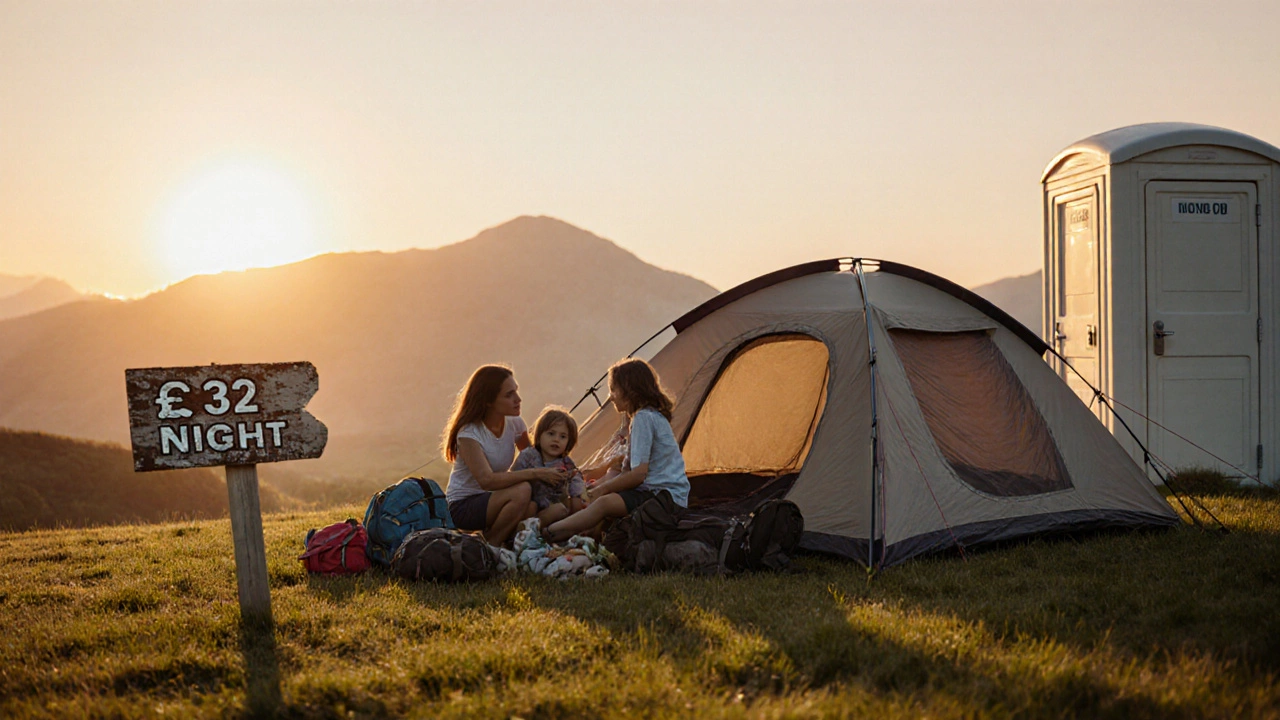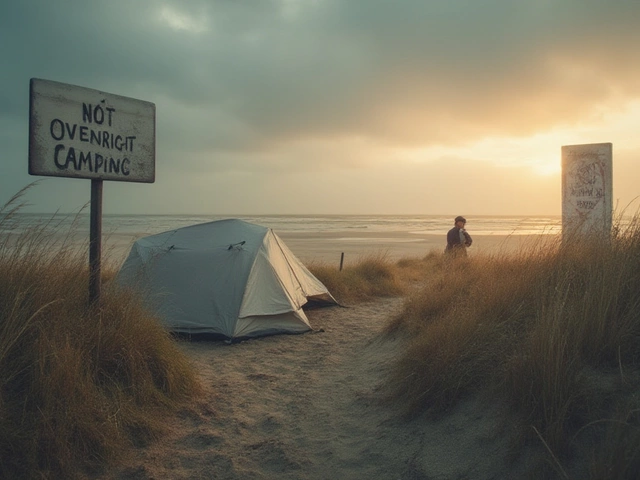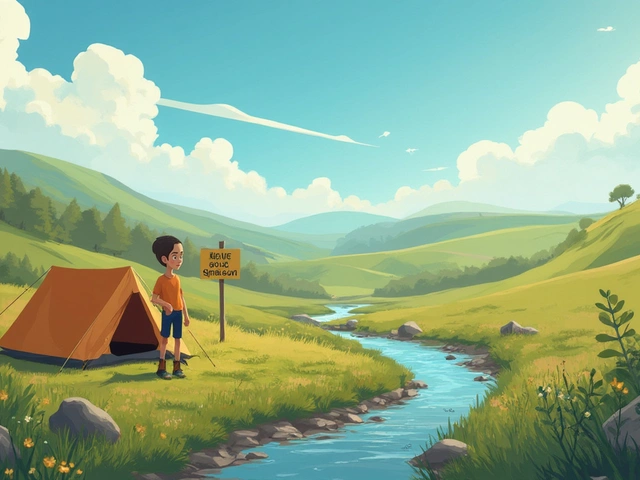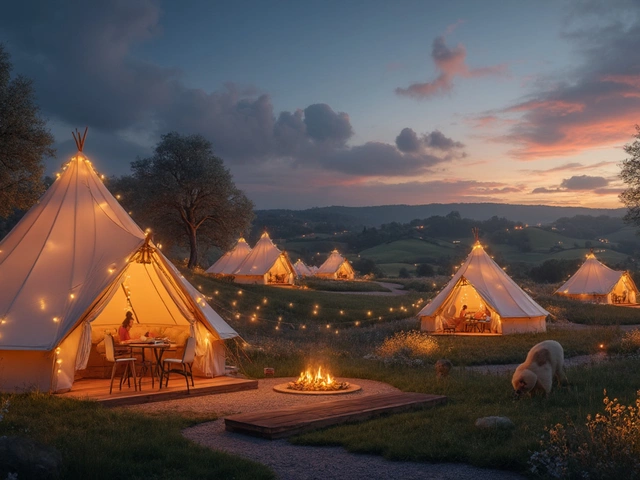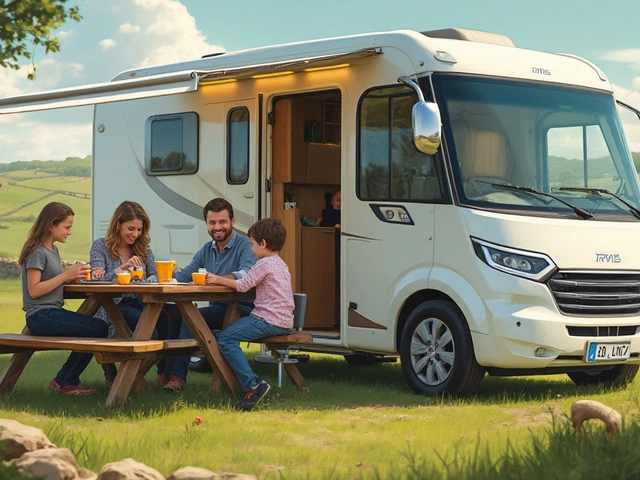UK Camping Cost Calculator
Calculate Your Trip Cost
Enter your camping details to estimate total costs
Estimated Cost Breakdown
Total: £0.00
* Prices based on UK camping averages 2025
* Includes £5-12 booking fee from third-party platforms
* Check site directly for exact rates and hidden charges
Want to know how much you’ll actually pay to camp in the UK this year? It’s not as simple as picking a spot and showing up. Prices vary wildly depending on where you are, what kind of site you choose, and even what day of the week you arrive. A basic pitch in the Lake District can cost twice as much as one in rural Wales. And luxury glamping pods? Those can run you over £100 a night. Let’s cut through the noise and show you exactly what you’re paying for.
Basic Pitch Prices: What You’ll Pay for a Tent
If you’re pitching a tent, you’re looking at £15 to £35 per night on average. That’s for a standard grass pitch with access to shared toilets and showers. Sites run by the National Trust or the Camping and Caravanning Club usually fall in this range. In peak season - July and August - prices climb. A Friday or Saturday night at a popular site like Llyn Y Fan Fach in Wales can hit £32. Weekdays? You might snag it for £18.
Low-season rates (October to March) often drop by 30-50%. Some sites even offer winter discounts for long stays. For example, a 7-night stay at a quiet site in the Peak District might cost £120 total - that’s under £17 a night. Always check for off-season deals. They’re real and often hidden on the site’s booking page.
Electric Hook-Up and Larger Pitches
Need electricity? That adds £5 to £10 per night. Most sites charge extra for electric hook-ups because they’re in high demand. If you’re running a fridge, kettle, or phone charger, you’ll want this. Sites without electric are usually cheaper, but you’ll be limited to battery power or gas.
Larger pitches for bigger tents or families? Expect to pay £25 to £45. These are often marked as ‘family pitches’ or ‘extra-wide’. They give you room for a tarp, a table, maybe even a small awning. Without one, you’re crammed in next to someone else’s tent. At a busy site like Pembrokeshire Coast National Park, a family pitch can cost £42 on a weekend.
Caravan and Motorhome Sites
Motorhome and caravan owners pay more - but it’s not just because of size. These sites often have dedicated waste disposal, water refills, and chemical toilet emptying points. Expect £25 to £50 per night. Premium sites with full hook-ups (electric, water, sewage) can hit £60, especially near tourist hotspots like the Jurassic Coast or the Lake District.
Some sites charge extra for water usage or waste disposal. Always ask. A site in Cornwall might charge £35 for the pitch, then £5 extra for each waste disposal. That adds up fast if you’re staying multiple nights. Sites run by the Caravan Club or the Camping and Caravanning Club usually include these in the price - worth the membership if you camp often.
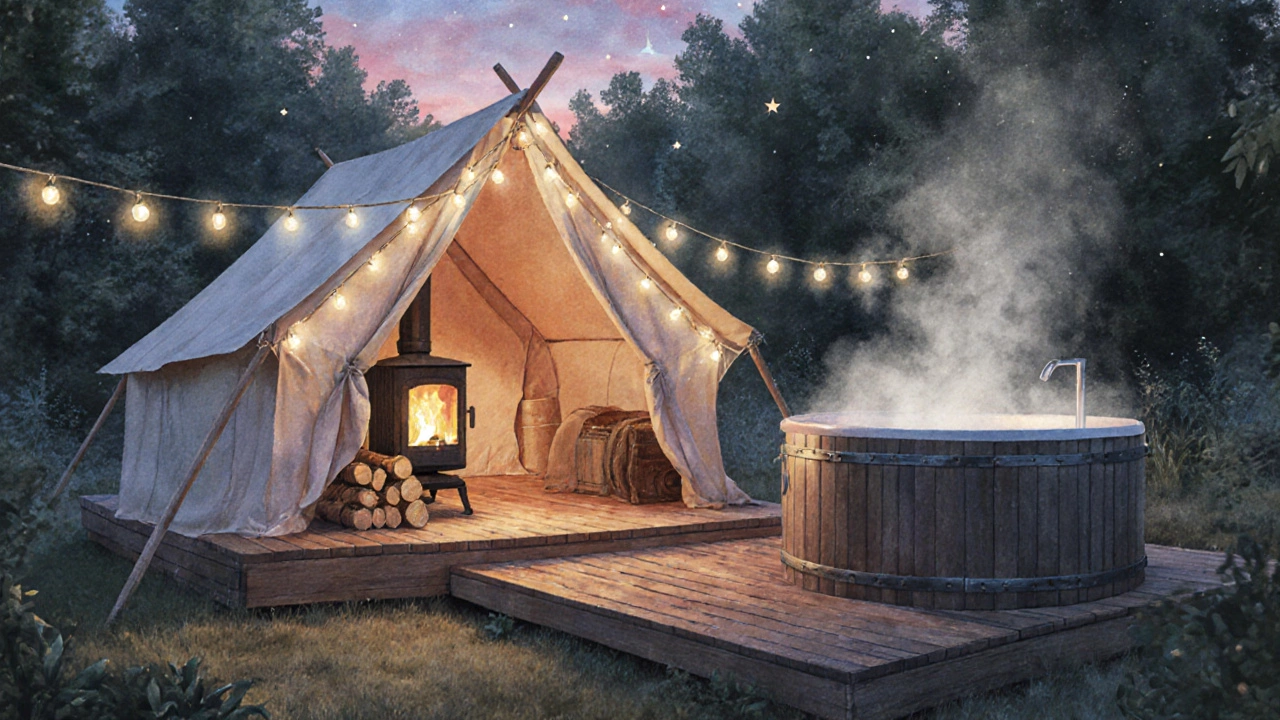
Glamping and Luxury Options
Glamping isn’t camping. It’s camping with a hotel upgrade. Think bell tents with wooden floors, log burners, and en-suite bathrooms. Prices start at £70 and can go up to £180 a night. A safari tent at a site like Wild Glamping in Devon includes a real bed, heating, and even a private hot tub. That’s not £70 for a pitch - that’s £70 for a fully furnished room.
Some luxury sites charge per person. A cabin with two beds might cost £120, but if you bring three people, it’s £180. Always check the fine print. What looks like a flat rate could be per person. Also, most luxury sites don’t let you bring your own tent. You’re paying for the whole experience - not just the land.
Free and Wild Camping: Legal or Not?
Wild camping is legal in Scotland, but not in England or Wales - except in very limited areas. Dartmoor National Park allows it with restrictions. You must camp above the 600m contour, no more than two nights in one spot, and leave no trace. No fees. No facilities. Just you and the hills.
In England, wild camping is technically illegal unless you have landowner permission. But some farmers and smallholders let campers stay for a small donation - £5 to £10 per night. Sites like Wild Camping in the Forest of Dean operate this way. It’s not advertised on booking platforms. You find them through local forums or apps like Park4Night.
Don’t assume you can pitch anywhere. Rangers in the Lake District have been issuing fines of up to £1,000 for illegal camping. Stick to official sites unless you’re certain you’re allowed to be there.
Booking Fees and Hidden Costs
Many sites use third-party booking platforms like Pitchup.com or Camping in the UK. These add a booking fee - usually £5 to £12 per reservation. Sometimes it’s buried in the final price. Always check the breakdown before you pay.
Other hidden costs:
- Security deposit: Some sites take £50 to £100 and hold it until you leave. They refund it if you leave the pitch clean.
- Pet fees: £3 to £7 per dog, per night. Some sites cap it at £20 for the whole stay.
- Extra vehicle fee: If you bring a second car or a trailer, expect £5 to £10.
- Early arrival or late departure: Most sites have a 3pm check-in and 11am check-out. If you arrive at 10am, you might pay £10 for early access.
Always call the site directly. Booking platforms often don’t tell you these extras until checkout. A site might charge £25 online, but when you call, they say, “We don’t charge for pets, and you can check in at noon for free.”
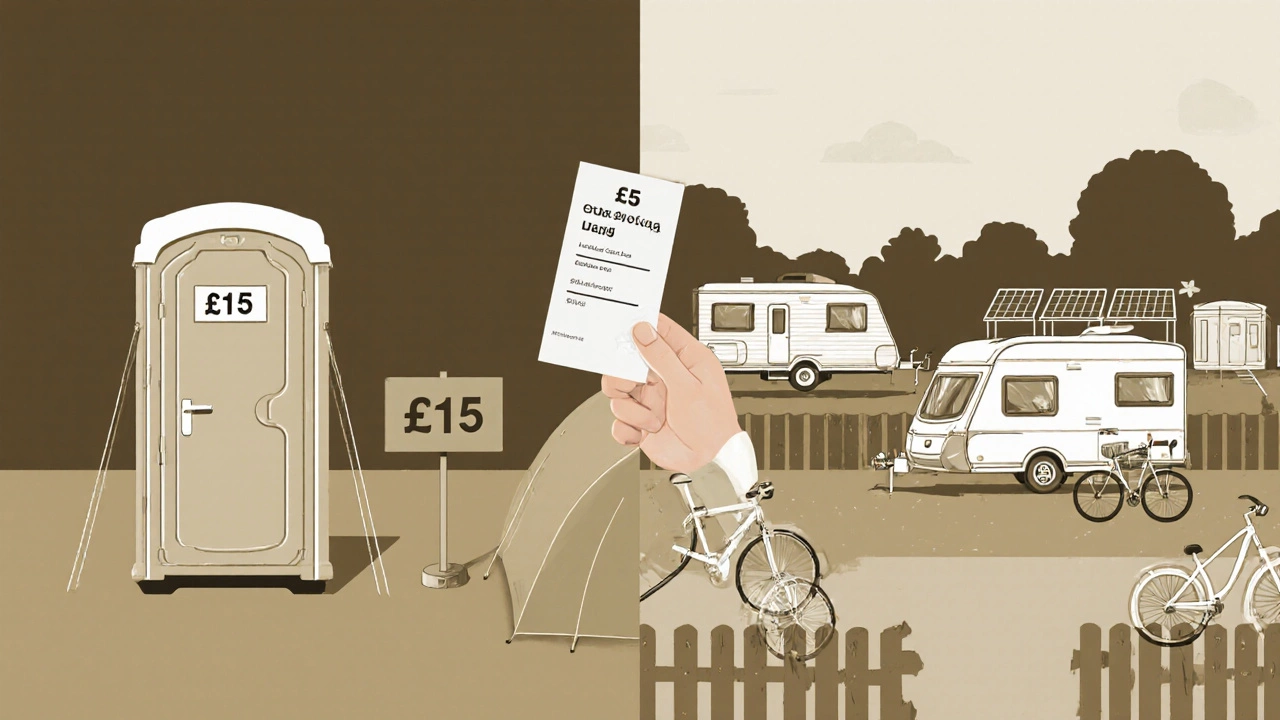
How to Save Money on UK Camping
You don’t need to spend £40 a night to camp in the UK. Here’s how to cut costs:
- Go midweek. Friday and Saturday nights are the most expensive. Sunday to Thursday can be 30% cheaper.
- Book early. Popular sites fill up months ahead. Last-minute deals are rare. But if you’re flexible, check for cancellations - sites often drop prices 48 hours before to fill empty pitches.
- Join a camping club. The Camping and Caravanning Club costs £45 a year. Members get 20% off at over 2,000 sites. That pays for itself in two trips.
- Use local council sites. Many towns run basic, no-frills campsites. They’re clean, safe, and cheap - often under £15. Search “[town name] council camping” - you’ll find them.
- Stay longer. Weekly discounts are common. A 7-night stay might cost £100 instead of £7 x £20 = £140.
What You’re Really Paying For
Don’t just look at the price tag. Ask yourself: What’s included? A £30 pitch with clean toilets, hot showers, and a shop on-site is better value than a £15 pitch with a single port-a-loo and no running water. You’re paying for comfort, safety, and convenience.
Top sites in 2025 are upgrading. More have solar-powered showers. Some offer free Wi-Fi. Others have bike hire, kids’ play areas, or even pizza delivery. A site in the Yorkshire Dales now includes a free hot drink at check-in. That’s not a gimmick - it’s part of the experience.
The cheapest site isn’t always the best. The most expensive isn’t always worth it. Compare what’s included - not just the number.
Final Thoughts: Budgeting for Your Next Trip
For a basic two-night tent trip in low season: £30-£50 total.
For a weekend family stay with electric in high season: £80-£120.
For a luxury glamping pod for two: £140-£200.
That’s the range. There’s no single answer. But now you know what drives the cost - location, season, facilities, and how much you’re willing to pay for comfort.
Plan ahead. Know what you need. And don’t be afraid to call the site. Most owners will tell you the truth - and sometimes, they’ll even give you a better deal.
Are UK camping fees higher in 2025 than last year?
Yes, prices have risen slightly across the board. Inflation, staff wages, and energy costs pushed average rates up by 5-8% in 2025. Luxury sites saw the biggest jumps - up to 12% - due to higher maintenance and service costs. Basic tent pitches saw smaller increases, mostly around 3-5%. Always check the site’s current rates before booking.
Can I camp for free anywhere in the UK?
Only in Scotland, where wild camping is legal under the Scottish Outdoor Access Code. In England and Wales, it’s illegal unless you have landowner permission. Some farmers and landowners allow short stays for a small donation - £5-£10 - but these aren’t official sites. Always ask before pitching your tent. Fines for illegal camping can reach £1,000.
Do I need to book a campsite in advance?
For popular sites - especially in national parks, coastal areas, or during school holidays - yes. Many fill up months ahead. Even midweek spots at places like the Lake District or Pembrokeshire can be booked solid in summer. For quiet, rural sites, you might get away with a same-day booking, but it’s risky. Always book ahead unless you’re prepared to drive around looking for space.
Are there discounts for long stays or families?
Yes. Many sites offer weekly discounts - 10-20% off for stays of 5+ nights. Families often get reduced rates for extra children under 12. Some sites let kids under 5 camp for free. Always ask when booking. Discounts aren’t always listed online - calling the site directly is the best way to find them.
What’s the best way to compare campsite prices?
Use Pitchup.com or The Camping and Caravanning Club’s site. They let you filter by price, facilities, and location. But don’t trust them alone. Always check the site’s own website. Third-party platforms add booking fees and sometimes hide extra charges. The site’s direct booking page will show the true total - including any discounts or inclusions.
